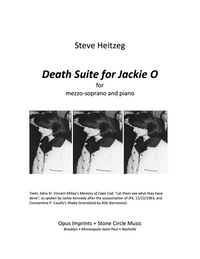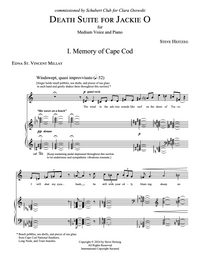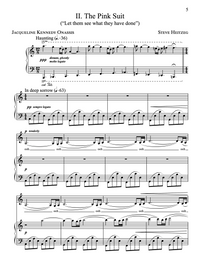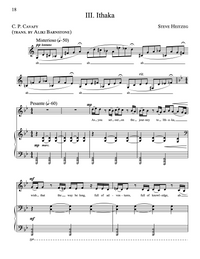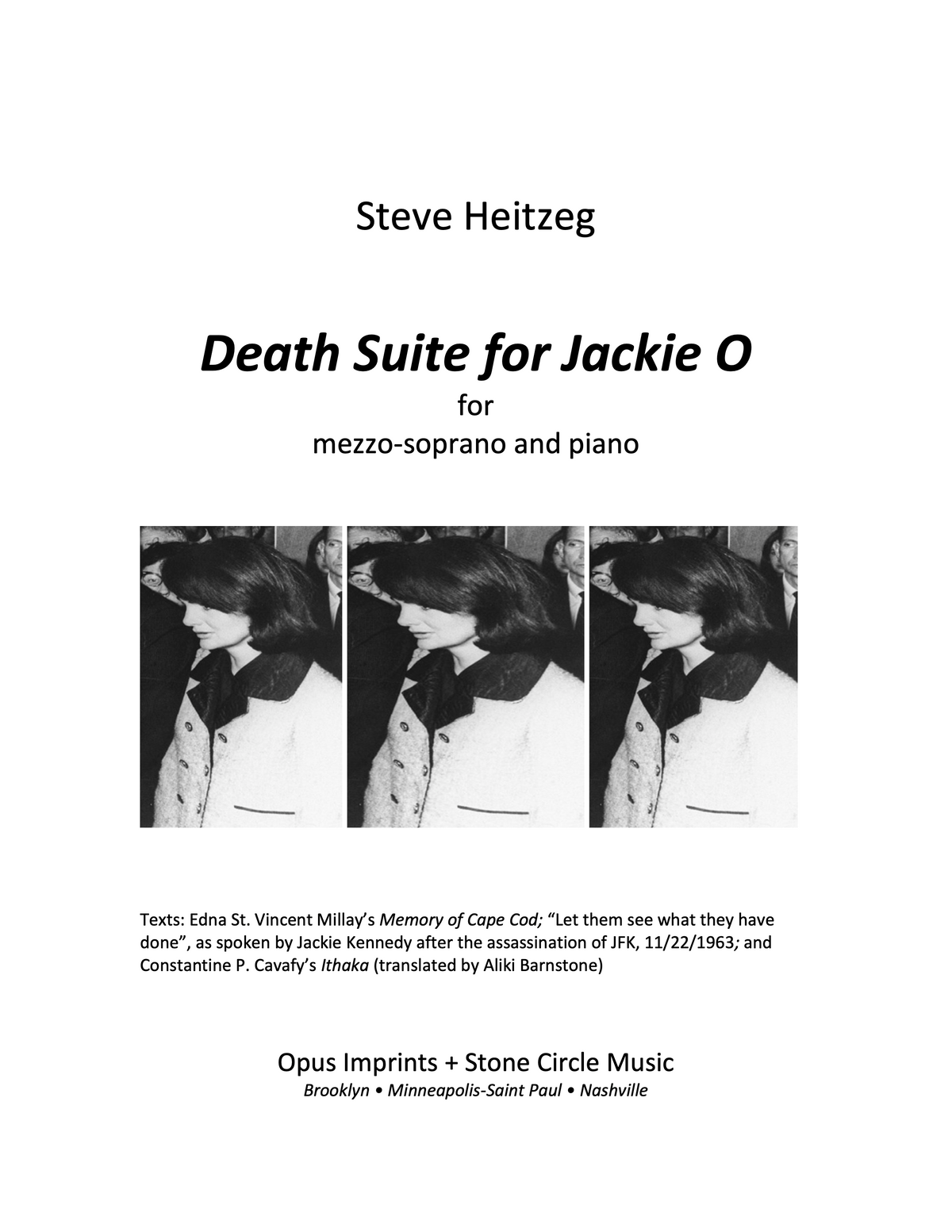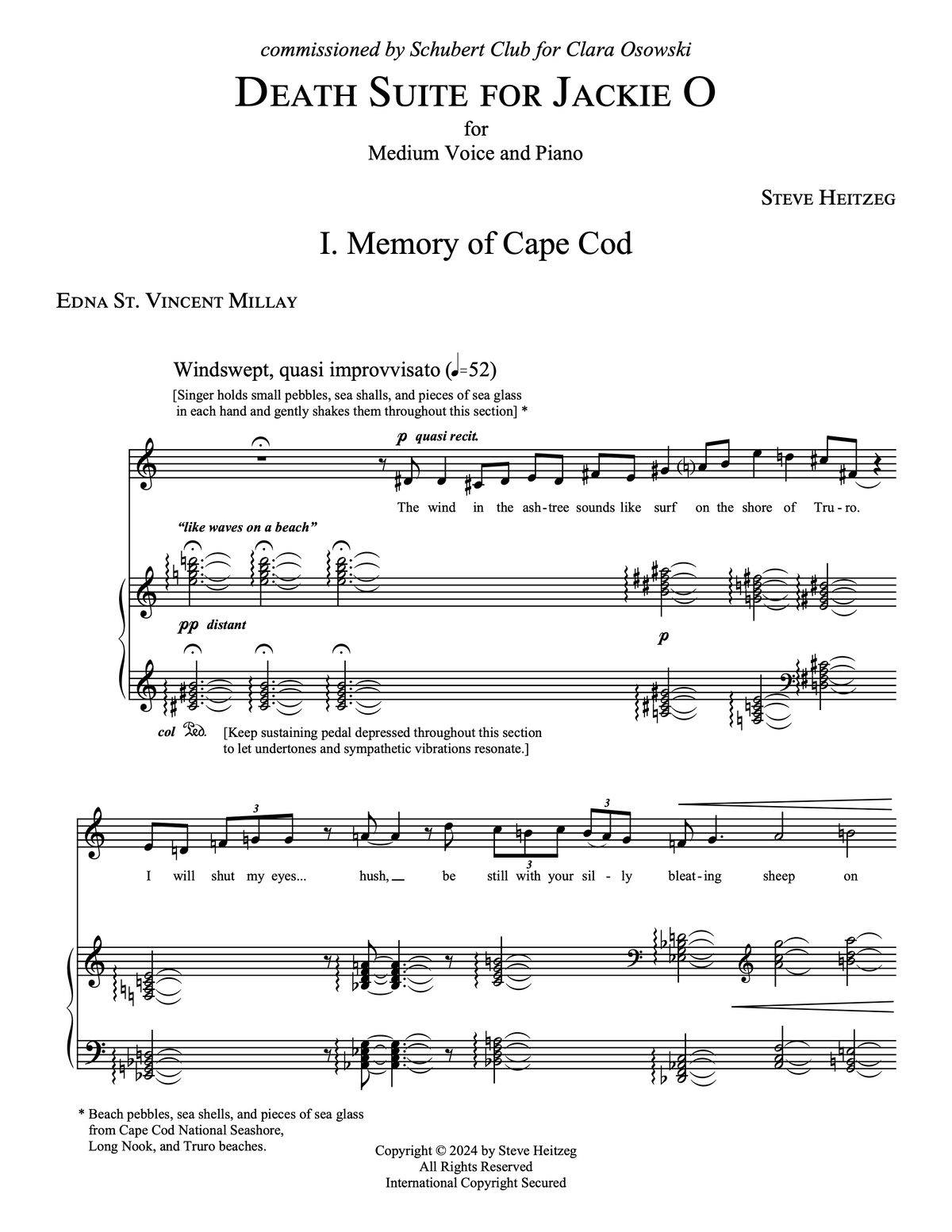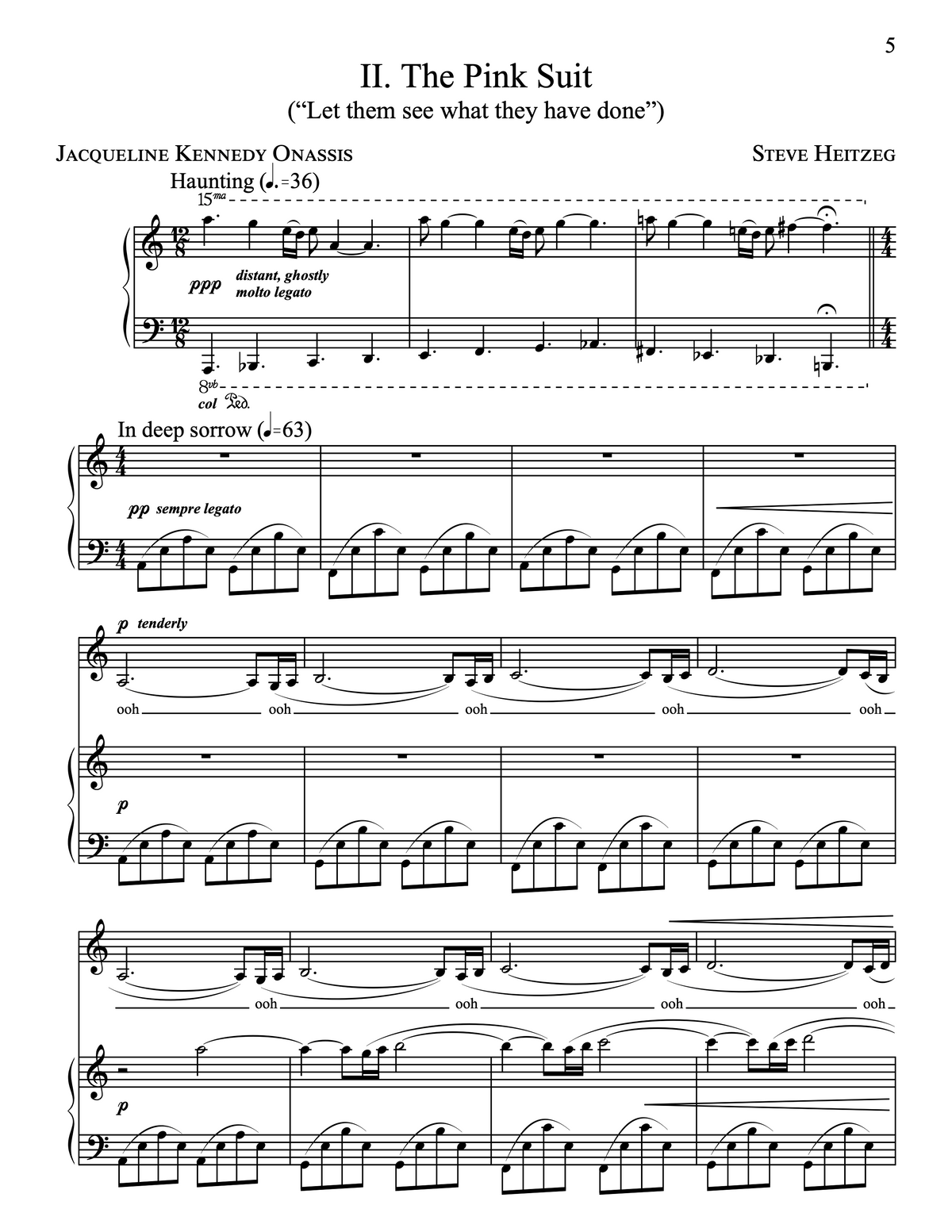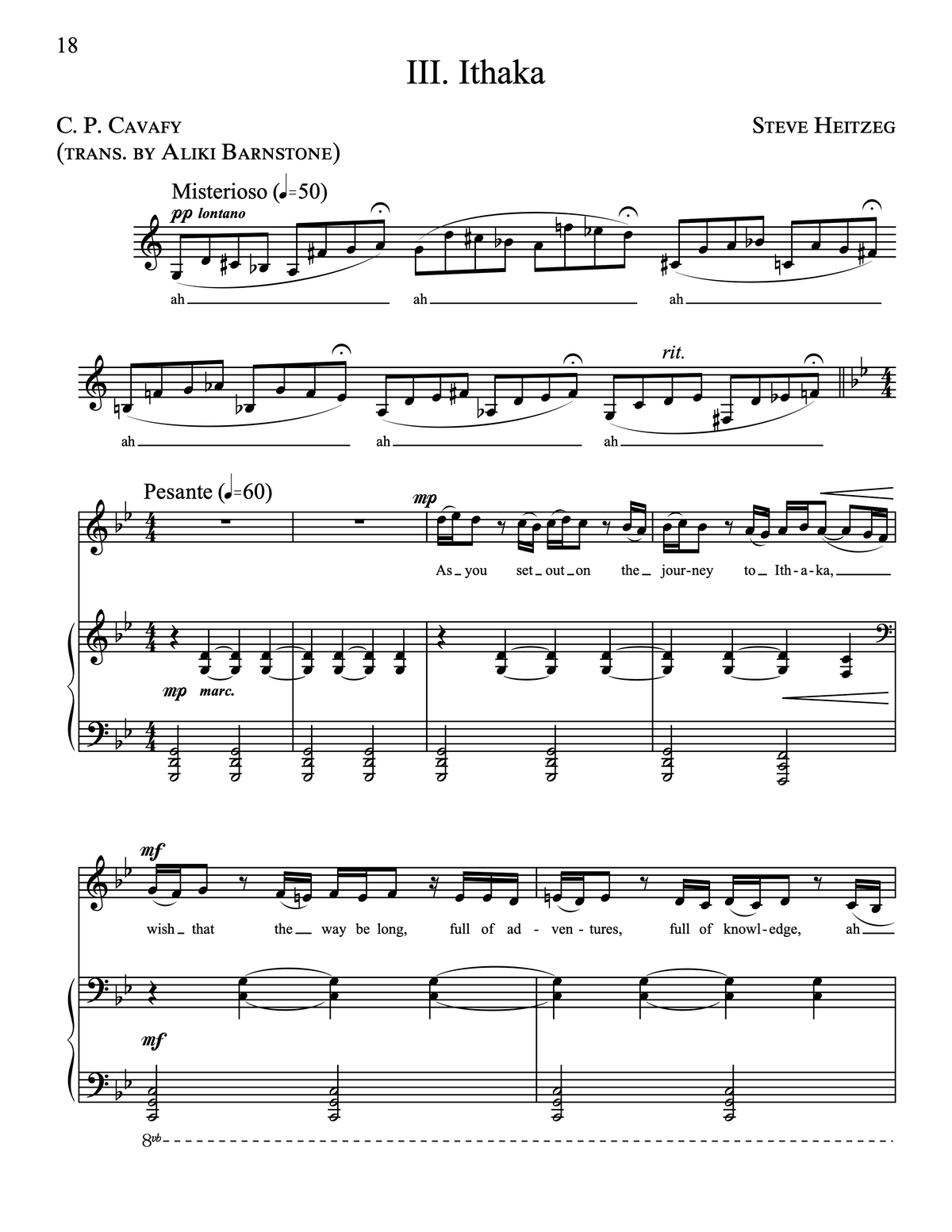Death Suite for Jackie O – Steve Heitzeg
- Regular
- $14.99
- Sale
- $14.99
- Regular
- Unit Price
- per
Composer: Steve Heitzeg
Text by: Edna St. Vincent Millay’s Memory of Cape Cod; “Let them see what they have done”, as spoken by Jackie Kennedy after the assassination of JFK, 11/22/1963; and Constantine P. Cavafy’s Ithaka (translated by Aliki Barnstone)
Instrumentation: mezzo-soprano and piano
Duration: Approx. 17 minutes
Date Written: 2024
Premiered by: Clara Osowski, mezzo-soprano Casey Rafn, piano Schubert Club’s Courtroom Concert Series Landmark Center Saint Paul, MN January 2, 2025 (world premiere performance).
Clara Osowski, mezzo-soprano, Casey Rafn, piano, Westminster Hall, Minneapolis, MN January 3, 2025
Additional Information:
Designed as a song cycle in honor of Jacqueline Kennedy Onassis, the piece is in three movements.
I. Memory of Cape Cod
With its lyrical and bucolic setting of the Edna St. Vincent Millay poem, this
movement is intended to evoke Jackie Kenney’s time spent at Hyannis Port.
II. The Pink Suit (“Let them see what they have done.”)
JFK was assassinated November 22, 1963 in a motorcade in Dallas, Texas.
Seated next to her husband, Jacqueline Kennedy was covered in his blood
and brain matter following the shooting. Later that day, when asked if she
wanted to change out of her blood-soaked Chanel-inspired Chez Ninon pink
suit she replied ”Let them see what they have done.”
Although specifically associated with JFK’s assassination, this text “Let them
see what they have done” can be viewed in a larger context. The pink suit
itself is a metaphor of resistance to violence—it insists on making us look
and not turn away from the resulting consequences.
This lament and song of grief is an attempt to evoke a heightened
timelessness of mourning and the dream of nonviolence.
III. Ithaka
Based on the homeward journey of Odysseus in Homer’s Odyssey, this
poem was read at Jacqueline Kennedy Onassis’ funeral in 1994 at the
Church of Saint Ignatius Loyola, NYC. This movement is influenced by
ancient Greek modes (specifically Lydian and Ionian) and lyrically-infused
synthetic scales designed by the composer—in an attempt to merge the
ancient with the modern.
—Steve Heitzeg
August 27, 2024
Text:
I. Memory of Cape Cod
By Edna St. Vincent Millay
The wind in the ash-tree sounds like surf on the shore at Truro.
I will shut my eyes . . . hush, be still with your silly bleating, sheep on Shillingstone Hill . . .
They said: Come along! They said: Leave your pebbles on the sand and come along, it's long after sunset!
The mosquitoes will be thick in the pine-woods along by Long Nook, the wind's died down!
They said: Leave your pebbles on the sand, and your shells, too, and come along, we'll find you another beach like the beach at Truro.
Let me listen to wind in the ash . . . it sounds like surf on the shore.
The Harp-Weaver and Other Poems by Edna St. Vincent Millay.
New York: Harper & Brothers, 1923.
[Text: Public Domain]
II. “Let them see what they have done.”
As spoken by Jackie Kennedy when asked if she wanted to change out of her blood-soaked Chanel-inspired Chez Nino pink suit following the assassination of JFK, 11/22/1963.
III. Ithaka
By C.P. Cavafy (translated by Aliki Barnstone)
As you set out on the journey to Ithaka,
wish that the way be long,
full of adventures, full of knowledge.
Don’t be afraid of Laistrygonians, the Cyclops,
angry Poseidon, you’ll never find them on your way
if your thought stays exalted, if a rare
emotion touches your spirit and body.
You won’t meet the Laistrygonians
and the Cyclops and wild Poseidon,
if you don’t bear them along in your soul,
if your soul doesn’t raise them before you.
Wish that the way be long.
May there be many summer mornings
when with such pleasure, such joy
you enter ports seen for the first time;
may you stop in Phoenician emporia
to buy fine merchandise,
mother-of-pearl and coral, amber and ebony,
and every kind of sensual perfume,
buy abundant sensual perfumes, as many as you can.
Travel to many Egyptian cities
to learn and learn from their scholars.
Always keep Ithaka in your mind.
Arriving there is your destination.
But don’t hurry the journey at all.
Better if it lasts many years,
and you moor on the island when you are old,
rich with all you have gained along the way,
not expecting Ithaka to make you rich.
Ithaka gave you the beautiful journey.
Without her you would not have set out on your way.
She has no more to give you.
And if you find her poor, Ithaka did not betray you.
With all your wisdom, all your experience,
you understand by now what Ithaka means.
“Ithaka” from The Collected Poems of C.P. Cavafy, translated by Aliki Barnstone.
Copyright © 2006 by Aliki Barnstone.
Used by permission of W.W. Norton & Company, Inc.

